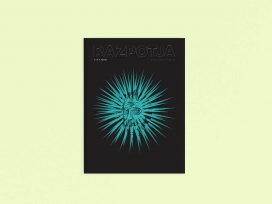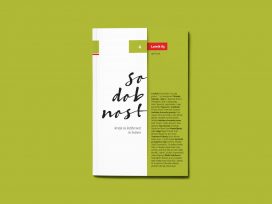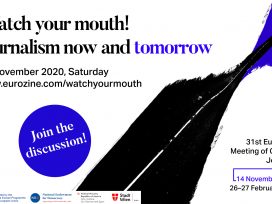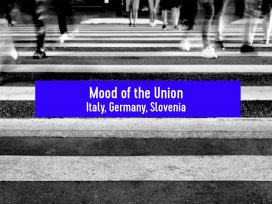Not long ago, a journalist from the Slovenian newspaper Vecer wrote that while culture does not rank among the top priorities of Maribor’s city leaders, they are nevertheless more than happy to boast about the European Capital of Culture (ECC) project for 2012. The general reduction of funding for, and dissembling of, the multicultural centre Pekarna is in stark contrast. He was not the first to highlight this contrast; it has become a standard criticism of the Maribor municipality. The difficulty, in his point of view, lies in the fact that “classical high culture” can always regenerate and easily survive thanks to its prestige, and popular (quasi) culture also has no difficulties since it is maintained by ever increasing commercialization and primitivization; the only victim, writes the journalist, is of course that which the Maribor authorities have condemned to a vegetative state and which belongs in the category of the modern, innovative, avant-garde, engaged and unconventional.
At first glance this conclusion is accurate, but it lacks a deeper and broader dimension. From the described “categorization” of our (or the municipal) understanding of the types of cultural production we could develop further thoughts. The implicit criticism, not only in the commentary described above but I dare assume also among most people, makes it sound as though the decision-makers who talk about and enjoy culture do not do so with any sincerity. As though they are not guided by a true moral concern. And that possibly, implicitly, they do not even know what culture is, as indicated by their “conceptualization” of this term. We could agree with this; however, in the continuation I will set out a contrasting viewpoint, from which it is possible to clearly understand that this “conceptualization” has indeed happened. The dilemma is nicely described by this anecdote: At a recent round table discussion on the fate of Maribor’s Pekarna I sat down with the mayor and his important co-worker when the moderator of the discussion asked the latter a provocative question as to whether she knows what alternative culture is. Her answer was that she need not answer the question since she has a university degree in cultural studies!
Those whose eyes light up when they talk about the ECC, since presumably they know what culture is, have difficulty tolerating doubts and constructive criticism. They frequently return to the thesis that a cultural greyness rules Maribor and that some simply cannot do without it. One ECC would destroy the thesis about Maribor’s fate as a cultural backwater, and even if the world ends they would like to overcome such deterministic limitations. Their explanation is at least in some instances not well-intentioned. No one wants to deny Maribor the opportunity promised. But we all wonder whether the decision-makers on the fates of culture and its social and media images have really thought through their concepts.
In recent weeks there has been a lot of discussion concerning not only the symptoms of comprehending culture through the Pekarna model of the urban alternative, but also of the drastic cuts in funding for some ongoing projects (the Litera publishing house, the journal Dialogi). And this is the true context for the criticisms of the declarative and proud advocacy of the ECC, in the course of which the hidden motives of the simultaneous idolatry and dwindling (or valuing) of heterogeneous cultural praxes have been skirted. Or in other words: the moral reproach has concentrated too much on the fact, otherwise accurate, that in Maribor we will proudly display our culture in a few years, while at the same time today we don’t care much about it. What has been overlooked here is that there are not just two representations of culture, such that someone idolizes one and despises the other, that for example alternative, publishing, literary and humanistic content is denounced while for example the pompous spectacle-like theatrical productions of a Tomaz Pandur are lauded. Because the spontaneous hierarchization is just one aspect in all this. The value differentiation of culture could be illustrated with two extremes, which we have understood as having to do with their content, but in truth they are mediated.
However praiseworthy the widespread spontaneous support for Pekarna was, we should already at the root be questioning the reasons why we see one thing as culture but not another. In Dialogi we already empirically proved some years ago what counts in some media. In Maribor there are dozens of events of the humanistic type, but for those who direct the local media these will be excluded from the register and hence remain “uncultured”. The humanities, social sciences, media and similar genres do not qualify as cultural news, events or facts: these remain primarily confined to literature, the visual arts, film and theatre. Even the polemics about the fate of Pekarna and the significance of cultural productions nurtured there have not for the most part been featured on the cultural pages of newspapers and other media, and we are even less likely to find the years-long programme content there. So why are we surprised when someone deliberately fails to award the term “cultural event” to hundreds of events? Or if, for example, the only mention throughout the entire year of Maribor’s journal Dialogi, which you are holding in your hands, was devoted to the news item that the municipality was cutting its programme funds? If it weren’t for this unhappy moment, would it not even exist? Perhaps we should not blame this one-dimensional nature of the press and media only on greedy owners and capitalist tycoons who in our place select the new tastes which we must consume. The new local authorities, not receptive to the idea of something new, have an inborn sense of eliteness their preferences have been shaped according to the media. Or vice-versa.
To be sure, spontaneous stratification does not take place only according to the criterion of conceptual comprehension, but also according to the power of the rustling of money. Those who prefer a certain type of culture and proudly regard the ECC project have their calculations, financial and/or political. Thus some city cultural managers, who administer the project as secretaries, are already covering their current and ongoing programmes from the common budgetary purse for the ECC. The dichotomization of the cultural landscape will occur not only on the basis of conventionality and unconventionality but also of brilliance, pride, and money on the one hand, and misery and deprivation on the other. Culture is just one more sphere where you can flex your muscles and socially determine what is dominant and what is not. It is truly sad and symptomatic for Maribor that there may well be a finding “post festum” that the ECC project was in the sense described a very damaging event for culture in the city. Let us hope that it does not come to this.






